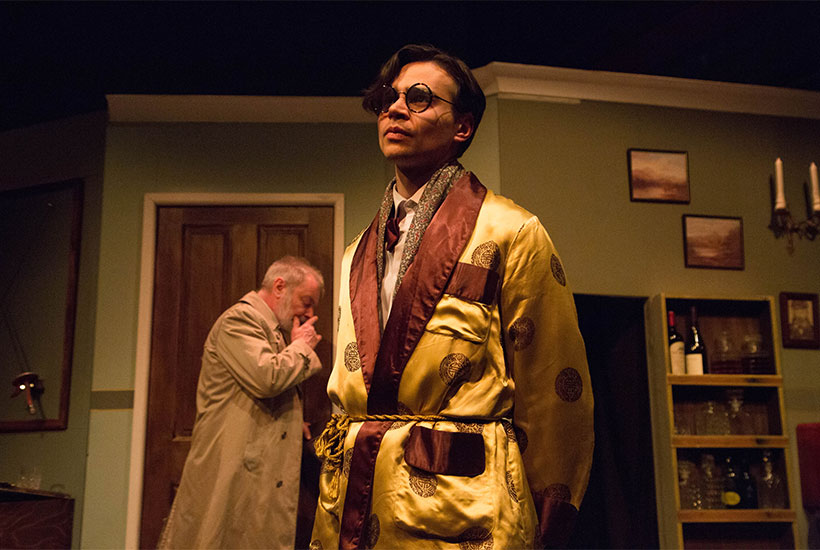Here’s the problem. Much communication is done online, especially by youngsters, and much drama focuses on communication. So how do theatre-makers represent emails and telephonic chitchat in ways that are stimulating and realistic? The usual solution is to mount blank screens around the stage and to beam the comms on to the boards while the characters crouch over their devices, tapping away. Realistic, yes. Hardly stimulating. When play-goers have seen this once — and most of us have seen it repeatedly — they crave a new approach.
Roxana Silbert’s production of Al Blyth’s spy drama The Haystack projects the text messages just like everyone else. And the show relies too heavily on photographic inserts. Audiences make a deliberate effort to see human beings on stage and it’s unfair to fob them off with snapshots and voiceovers instead of actors.
Rona Morison plays Cora, a cub reporter stuck in ‘blogger’s corner’ at the Guardian. She delivers a series of brilliant scoops from a well-placed source in the Middle East. Her editor is impressed. Promotion beckons. But when her source goes missing — bumped off probably — Cora suffers a mental breakdown. She’s being secretly monitored by Neil, a lonesome geek at GCHQ, who uses private data about her life to set up a meeting. They start an affair. He’s living a lie. She doesn’t know the truth.
This is a strong idea and their romance is complicated by Cora’s struggles with depression. ‘Life’s too short. And if it’s not there’s always suicide,’ she says with chilling glibness. The relationship could develop into marriage and family life, and so on, but it remains in the lovey-dovey honeymoon phase. And it all comes to a juddering halt when the writer throws in a twist that is more comical than credible.
Morison, who gives Cora a dazed, tortured innocence, is the show’s outstanding feature. Real star quality there. But Blyth has been overindulged by his script editor. The play lasts nearly three hours and it gobbles up too much stage time telling us about life at the Guardian and GCHQ. This is interesting, in a way, but it doesn’t drive the story forward. The lovebirds, Cora and Neil, both have female bosses who are pragmatic, shouty types played by Lucy Black and Sarah Woodward. These characters are interchangeable, and neither of them has much bearing on the narrative. Neil’s garrulous sidekick, Zef, also makes little impact. All three characters could be ditched, the script could be cut in half, and a terse, 90-minute spy romance would emerge. One final niggle. It’s laughable to suggest, as this play attempts to, that the gravest threat to Britain’s security is located at the Guardian among its complement of nicely brought up young ladies with arts degrees.
The programme notes for Corpse! by Gerald Moon compare it with Sleuth and Deathtrap which are among the best crime comedies ever written. Corpse! premièred in 1983 and has enjoyed runs in the West End and Broadway. ‘You may die laughing,’ warns a notice from the New York Post. This sets the bar very high.
The location is Soho, 1936, on the eve of Edward VIII’s abdication. We meet a struggling young actor, Evelyn, whose purring landlady, Mrs McGee, hints that his rent arrears might be payable in kind. Evelyn is a charming failure — strong shades of Withnail here — whose identical twin brother, Rupert, is a millionaire living in a Regent’s Park townhouse. Evelyn plots to bump off Rupert and to step, quite literally, into his shoes. If Rupert’s disappearance can be covered up, Evelyn will be able to lead the opulent life he feels he deserves. To carry out the assassination he hires a shifty Irishman, Powell, who claims to have served as a major in the British army. But Powell’s recitation of his Great War experiences — ‘Mons, Wipers, the Somme, it was terrible’ — sounds like a scripted performance. Clearly the man is just a crook on the make. When Evelyn pops out of his bedsit for a moment, the ‘major’ immediately pilfers an ashtray and a string of stage pearls.
Clive Brill’s direction of this cracking thriller exploits the small space brilliantly. By using an ingenious set of stage effects he creates the impression that real-life twins have been hired to play Rupert and Evelyn. In fact a single thesp, Tom York, takes both roles, and he distinguishes them with convincing precision. Rupert is cold, hard and thrifty whereas Evelyn is full of fun, wit and mischief. This is important because the audience has to sympathise with Evelyn’s wicked plan to murder his nearest relative and to steal all his money. Powell (exquisitely played by Paul Kemp) botches Rupert’s killing, of course, and the script develops in ways that will keep even the nimblest mind guessing. A high bar, indeed, but cleared with aplomb.







Comments